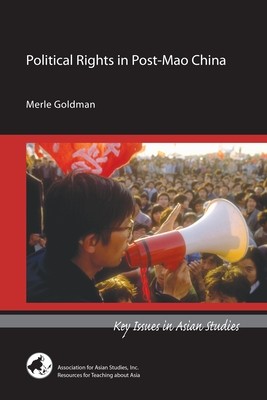
- We will send in 10–14 business days.
- Author: Merle Goldman
- Publisher: Association for Asian Studies
- Year: 2007
- Pages: 80
- ISBN-10: 0924304510
- ISBN-13: 9780924304514
- Format: 15.2 x 22.9 x 0.5 cm, minkšti viršeliai
- Language: English
- SAVE -10% with code: EXTRA
Reviews
Description
Political Rights in Post-Mao China provides an engaging overview of political changes in China in the later decades of the twentieth century and early years of the twenty-first century, highlighting the growing rights consciousness movement among China's citizens. Professor Goldman explains how demands for Party reform and the increasingly organized struggle for democracy and political rights have spread from their beginnings among China's urban intellectuals to mass demonstrations held by workers, farmers, and the growing middle class. China's moves toward a free market economy have provided these various groups with access to new technologies--including the Internet and cell phones--that help organize their political protests. This book is invaluable to anyone wishing to understand the political dynamics of reform-era China and will appeal to teachers and students of many disciplines--including anthropology, Asian studies, geography, government, history, philosophy, political science, religion, and sociology.
EXTRA 10 % discount with code: EXTRA
The promotion ends in 22d.11:12:04
The discount code is valid when purchasing from 10 €. Discounts do not stack.
- Author: Merle Goldman
- Publisher: Association for Asian Studies
- Year: 2007
- Pages: 80
- ISBN-10: 0924304510
- ISBN-13: 9780924304514
- Format: 15.2 x 22.9 x 0.5 cm, minkšti viršeliai
- Language: English English
Political Rights in Post-Mao China provides an engaging overview of political changes in China in the later decades of the twentieth century and early years of the twenty-first century, highlighting the growing rights consciousness movement among China's citizens. Professor Goldman explains how demands for Party reform and the increasingly organized struggle for democracy and political rights have spread from their beginnings among China's urban intellectuals to mass demonstrations held by workers, farmers, and the growing middle class. China's moves toward a free market economy have provided these various groups with access to new technologies--including the Internet and cell phones--that help organize their political protests. This book is invaluable to anyone wishing to understand the political dynamics of reform-era China and will appeal to teachers and students of many disciplines--including anthropology, Asian studies, geography, government, history, philosophy, political science, religion, and sociology.


Reviews